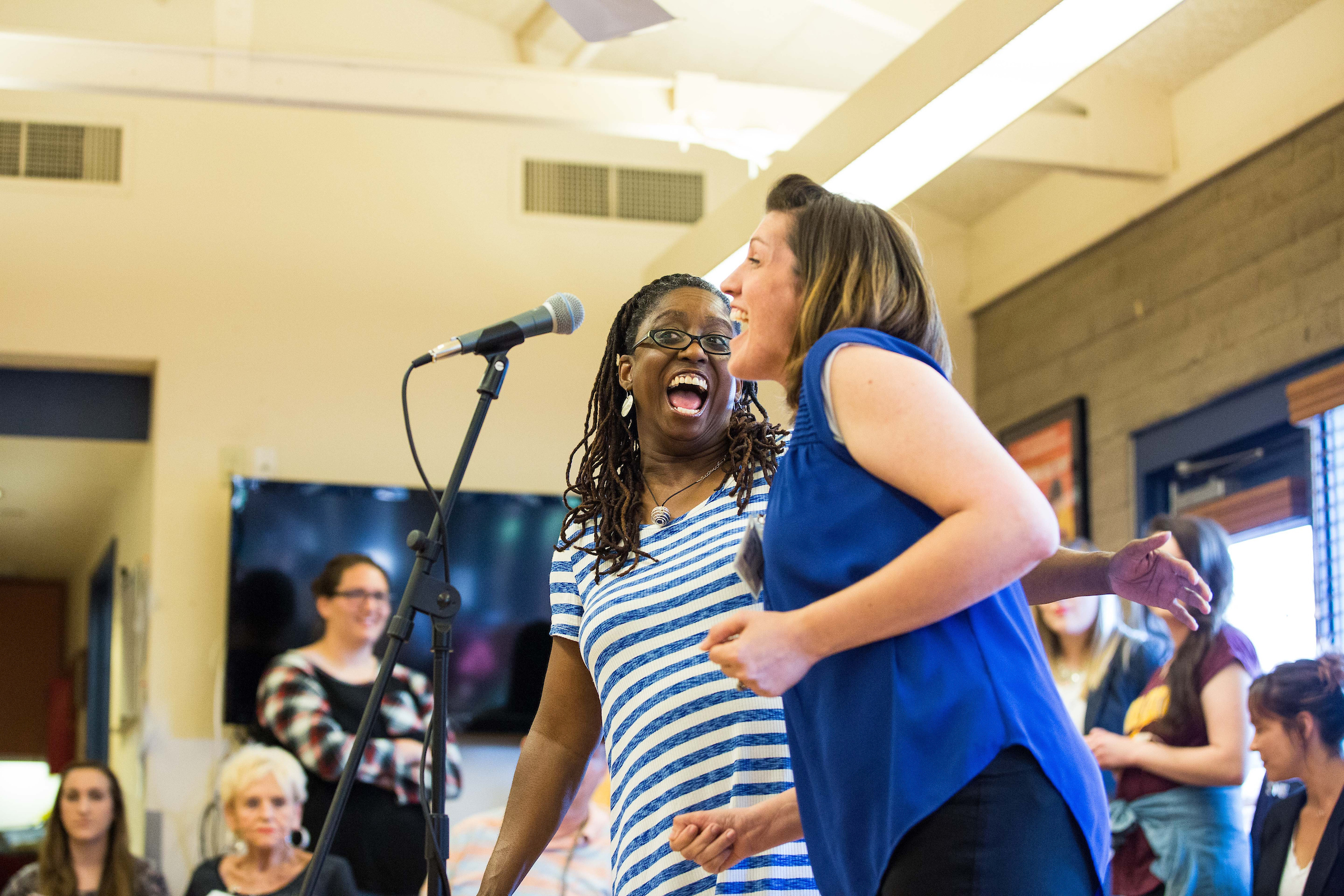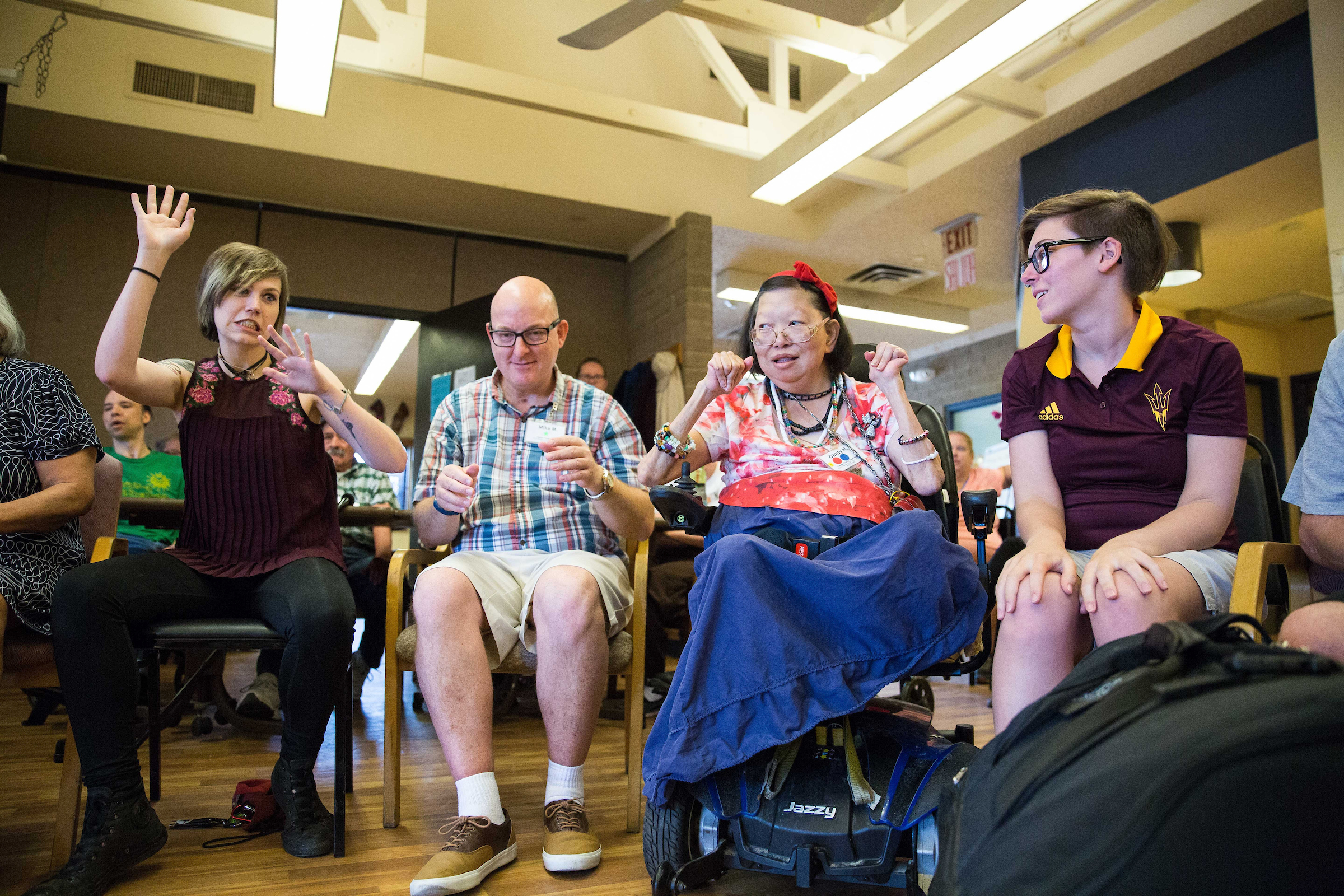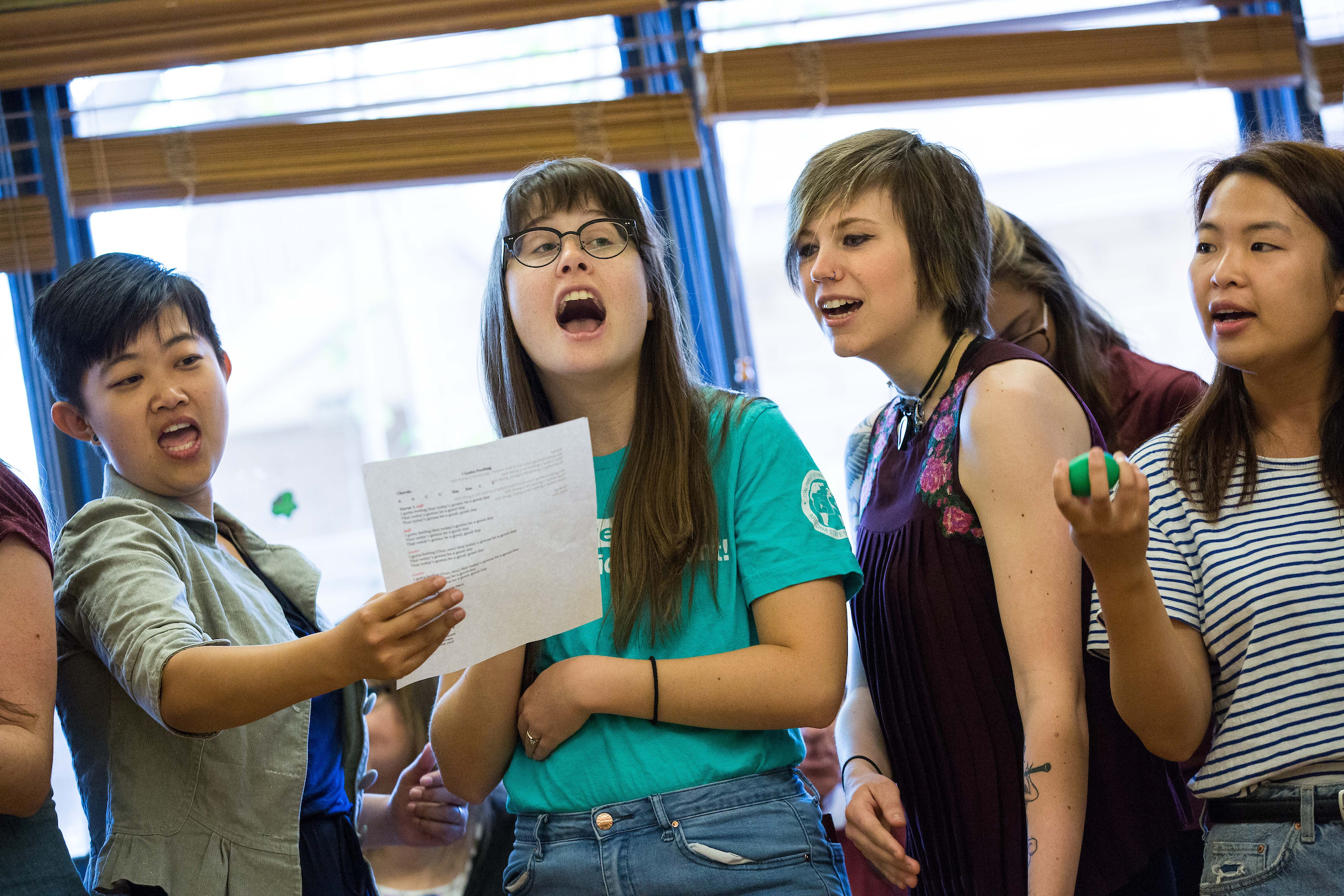ASU music-therapy students help bring joy to adults at Tempe day center
Talent show caps class that teaches techniques for reaching older minds
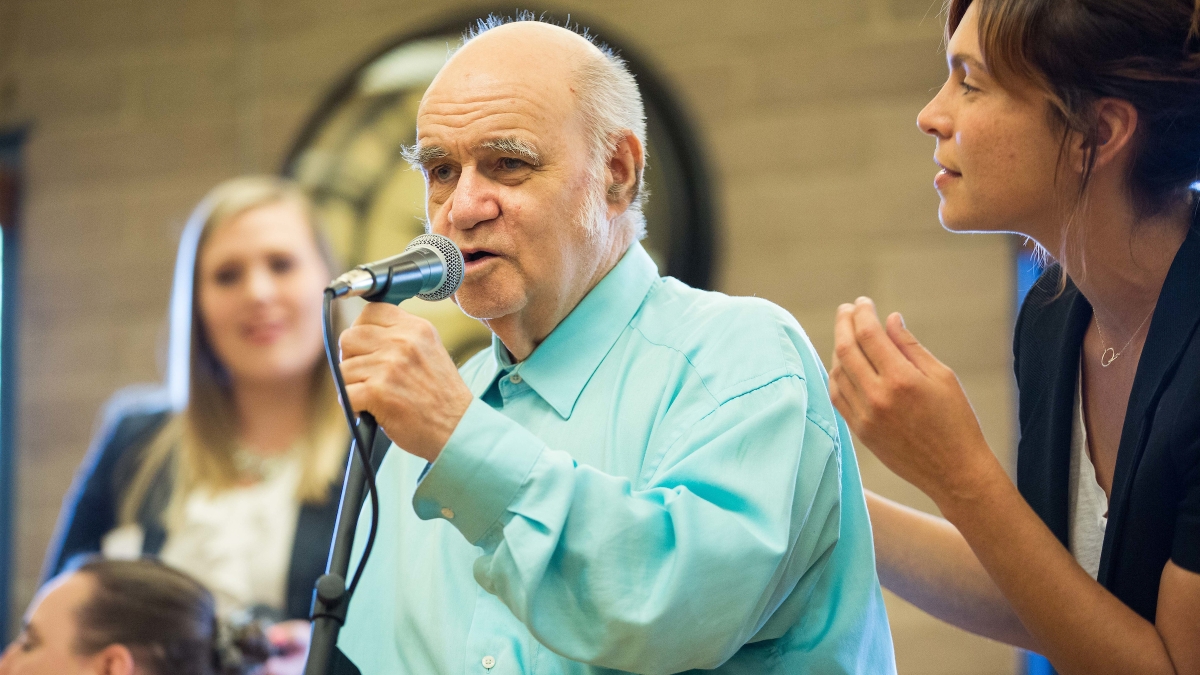
Editor's note: This story is being highlighted in ASU Now's year in review. Read more top stories from 2018 here.
"What would you think if I sang out of tune? Would you stand up and walk out on me?
"Lend me your ears and I'll sing you a song. And I'll try not to sing out of key."
The music was exuberant if not precise. Drums and homemade tambourines tapped out a beat to “Count On Me.” Bodies swayed and hands clapped to “The Macarena.”
Three older men tentatively plucked out chords to a slow-jam version of “Twist and Shout,” and a whole chorus of voices, a few of them shaky, closed the talent show by singing “With A Little Help From My Friends.”
The music played at the Tempe Adult Day Health Services center wasn’t meant to be perfect. It was intended to stimulate minds, spark a memory and encourage movement and laughter.
The musicians were clients at the center, older people who can’t be home alone during the day, some with dementia, and younger adults who have had a traumatic brain injury.
Their guides were 29 music-therapy students from Arizona State University, who spent six weeks this semester working with the clients, teaching songs, making instruments and practicing movement. The project was part of a class on music-therapy techniques that included juniors, seniors and first-year graduate students. The talent show last week was the culmination of their work.
“Music opens up the mind,” said Amanda Huffaker, a recreational therapist at the center. “With someone who’s nonverbal or minimally verbal, when we play music, they’ll start singing along.”
Video by Deanna Dent/ASU Now
The project was created by Melita Belgrave, an associate professor of music therapy in the School of Music at ASU. She said the center staff asked that the therapy include opportunities for clients to choose what they wanted to do and to express themselves.
“So now our classroom is the community, and it’s a very mutual relationship,” she said.
“It’s group cohesion, and it’s multigenerational. You have the ASU students, you have the younger adults with TBI and you have older adults, all working together to perform.”
ASU Associate Professor Melita Belgrave (left) and Amanda Huffaker, a recreational therapist, introduce performers last week at the Tempe Adult Day Health Services center. Photo by Deanna Dent/ASU Now
"What do I do when my love is away? Does it worry you to be alone?
"How do I feel by the end of the day? Are you sad because you're on your own?"
Music therapy is a way to get brains back to making connections, said Belgrave, who researches intergenerational programming.
“We learn so much about music therapy with disabilities in children, but we never really talk about it with adults,” she said. “Most of these adults, their traumatic brain injuries are six years post. The brain is not as plastic. They’re adults, and they remember they had a life before.”
She has found that even with a brain injury or Alzheimer’s disease, people can still learn.
“Earlier research focused on not learning new things but on recalling memory. But there comes a point when that become stressful because you’re asking me for something I just can’t retrieve,” she said.
The Tempe clients were learning new things because even if the song was an oldie like “I Can’t Help Falling in Love With You,” the students added interventions like playing an instrument or new lyrics.
And that makes it easier to remember things.
“If I just give you something and you repeat it back to me, that’s surface level. But if we sing you a piece of information, and if we add some movement, now it is encoding in your brain better so you can retrieve it faster,” she said.
In her work with people who had advanced dementia, the clients sometimes couldn’t speak, but when Belgrave would place maracas in their hands or play the guitar, they would light up and start to sing.
“I could see that they were still in there,” she said.
ASU has the only music-therapy program in Arizona, and the outlook for jobs is bright. Therapists work in neonatal intensive care units, rehabilitation units, senior centers and hospices.
“There’s so much to work on, and it’s a lifespan approach,” Belgrave said.
ASU music therapy students Tabitha Williams (far left) and Rachel Quirbach (far right) work with clients Mike Markgraf and Cindy Hikida at the talent show. Photo by Deanna Dent/ASU Now
"Do you need anybody? I need somebody to love.
"Could it be anybody? I want somebody to love."
The ASU students said the talent show was a rewarding way to see their work come to fruition.
“It was a combination of everything we’ve worked on, and it put all of our skills to the test,” said Taylor Page, who will graduate in December.
Acadia Caupp, a junior who is double majoring in music therapy and vocal performance, said she was moved by how cooperative the clients were.
“They all knew the songs and they were passionate about singing them, and they showed such a willingness to answer our questions,” she said.
Many of the students in the program are also performers but felt compelled to use their talent in a meaningful way.
“I got my first degree in guitar performance, but I wanted to get out of the idea of competition and find a way to help people,” said Max Greenwald, a first-year grad student.
“It’s fun working with the geriatric community because you can see a lot of visual progress, which is very rewarding.”
Alma Mitchell, a client at the Tempe center, said she loved working with the students.
“Well, I just love to sing every day, and everyone is so happy when they’re here.”
"Oh I get by with a little help from my friends.
"Gonna try with a little help from my friends."
ASU music-therapy students sing at the talent show at the Tempe Adult Day Health Services center: (from left) Ruihao Zhang, Eternity Stallings, Tabitha Williams and Miao Chen. Photo by Deanna Dent/ASU Now
Top photo: Donald Hutton sings "That's Amore" with help from music-therapy graduate student Jessi Teich during the end-of-semester performance at the Tempe Adult Day Health Center. Photo by Deanna Dent/ASU Now
More Arts, humanities and education
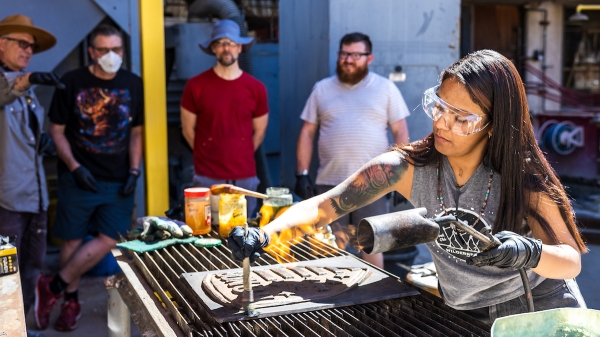
'Devils in the Metal': ASU vet leads iron cast workshop for former service members
Bruce Ward believes everyone has a symbol of strength or resilience, and they have an obligation to find it. His happens to be a paper crane in an ocean wave. “It’s the idea that we are the…
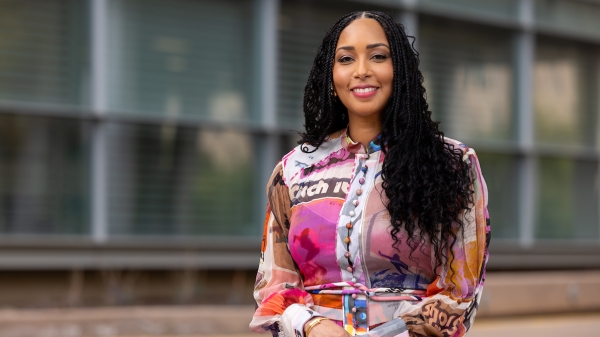
ASU English professor wins Guggenheim Fellowship for poetry
The awards — and opportunities — keep piling up for Safiya Sinclair, an associate professor in Arizona State University’s Department of English. In mid-April, Sinclair received one of 188 Guggenheim…
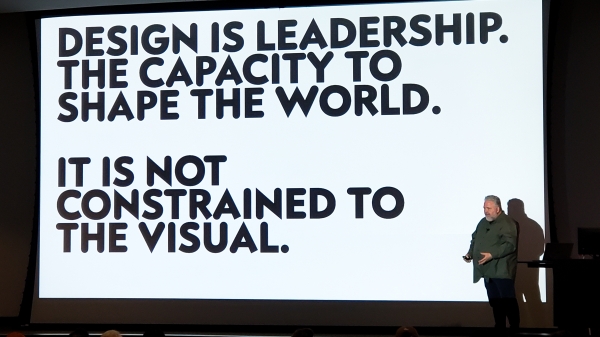
Designer behind ASU’s brand named newest Herberger Institute Professor
Bruce Mau, co-founder and CEO of the Chicago-based holistic design consultancy Massive Change Network, has joined Arizona State University’s Herberger Institute for Design and the Arts as its newest…
